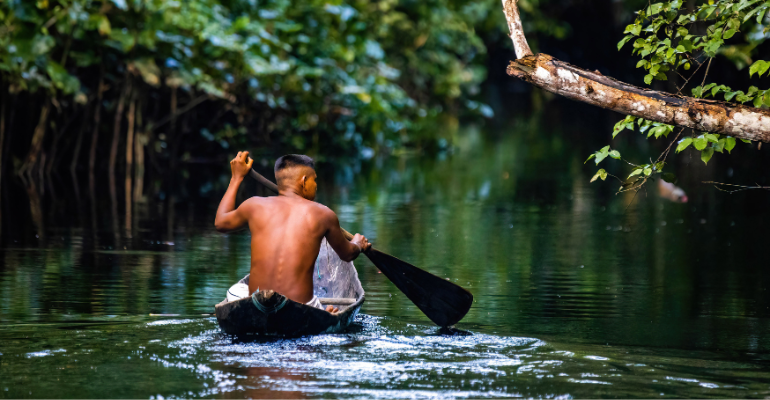
If not carbon offsets, then what?
For over twenty years, carbon markets have done precisely what they are supposed to do: delay real climate action. The offset industry promoting this mechanism has sought to control the narrative by suggesting that offsets “are the best option” to address the climate and – now also – the biodiversity crises.
Yet, as we have unpacked throughout this series, it’s time to accept that carbon offsets have become an obstacle to structural change by ensuring that the fossil fuel-dependent economy can continue under an illusion of climate action.
Big businesses, the drivers of most emissions, are not accountable for the public interest; their priority lies with their shareholders. Regardless of their claims about sustainability, their primary mandate is to generate shareholder value or private profits.
Emissions continue to rise(opens in new window) , and we are on track to significantly overshoot the 1.5C target established in the Paris Agreement.
The series ‘Facing the Facts: Carbon offsets unmasked’, which SOMO has published over the past 5 weeks, has shown that the offset industry needs to be abolished, and communities affected by offset projects must receive compensation and support. Ending the use of carbon offsets will bring clarity as companies will have nowhere to fudge the numbers or obscure inaction.
Alternatives to carbon offsets
Numerous initiatives already exist, and many alternative climate justice proposals are being developed by governments, groups, and movements worldwide. Here we outline some ideas outside of the “carbon offsets box”:
1. Strong regulation: limit greenhouse gas emissions and reduce production
Governments must enforce emission reduction targets for industries, ensuring these targets are met without the use of offsets. Genuinely hard-to-abate emissions should be disclosed but not offset. Regulations must focus on achieving absolute emission reductions(opens in new window) rather than relying on creative accounting tricks.
Planned degrowth(opens in new window) , foremost in Global North countries, needs to focus on reducing both production and consumption. This reduction should be considered not only quantitatively but also qualitatively by changing the way we produce and consume. This suggests a transition from an economic model of “growth at all costs” to one based on collective well-being. As Jason Hickel, professor of political economy, affirms(opens in new window) , “The majority of commodity production is geared toward accumulating profit rather than toward satisfying human needs. In fact, in a growth-oriented system, the goal is quite often to avoid satisfying human needs, and even to perpetuate need itself. Once we understand this, it becomes clear that there are huge chunks of the economy that are actively and intentionally wasteful, and which do not serve any recognisable human purpose.”
Governments must urgently phase out fossil fuel use through mandatory, enforceable action, with governments in the Global North taking the greatest responsibility to act first(opens in new window) and most swiftly. This involves stopping new fossil fuel projects(opens in new window) , which includes stopping exploration for and development of new fossil fuel extraction sites, as well as the permitting and construction of new, large-scale fossil fuel–consuming infrastructure. This clear mandate for phasing out oil extraction has been central(opens in new window) to discussions among many groups in the Global South for decades, with Ecuador leading the way by winning a referendum(opens in new window) to leave the oil under the Yasuní National Park underground. A Fossil Fuels Non-Proliferation Treaty(opens in new window) is also calling attention to this crucial measure.
2. Redistribution: paving the way for justice and equity
Since the climate crisis is embedded in the history(opens in new window) of colonialism and capitalism, climate action is connected(opens in new window) to the struggle for racial equality, the struggle for decolonisation(opens in new window) , the class struggle, the fight for Indigenous Peoples rights, feminism, and equality of access to health, food, water and land. The richest nations and elites are overwhelmingly responsible for the accumulation of pollution. Yet it’s the Global South and racialised communities, in particular, who suffer the most – from the consequences of the extractivist model as well as of the climate crisis.
Wealthy governments can unlock trillions(opens in new window) for real climate mitigation and adaptation funds by eliminating subsidies for fossil fuels and other harmful industries, making polluters and wealthy elites pay, and changing unfair financial rules. This would include terminating harmful tax treaties that limit countries’ ability to tax the income generated by foreign investments. This would also unlock funds in the Global South for supporting the protection of their forests and other biodiverse ecosystems.
Wealthy countries must act on their climate and ecological debts. The problem is not a lack of available funding(opens in new window) but choices about where funds go and who controls them. Governments must consider far-reaching lawful expropriation of excessive corporate and individual wealth, as well as impose a limit on the amount of wealth(opens in new window) that one person or entity can accumulate. Proposals for a frequent flyer levy(opens in new window) , for example, create more tax revenue and address inequality: 1% of the world’s population produces 50% of aviation emissions. Eliminating the possibility of companies using tax havens to avoid paying their fair share is another example. These funds must be allocated to create a safety net for a real and just transition that addresses structural transformations.
Examples include expanding public transport systems(opens in new window) and making them more accessible, recognition of communities’ land tenure(opens in new window) processes, and supporting small farmers(opens in new window) or urban agroecology initiatives, among many others. Such transitions are already being outlined and discussed in different platforms(opens in new window) , gathering existing and new ideas. These initiatives, however, should not be accounted for in terms of CO2 or any other standardised metric(opens in new window) and must not be used for greenwashing or other PR purposes.
3. Rethink the financial system: money should serve life
The financial system rewards exploitation, extractivism, and the pursuit of endless growth. It prioritises short-term profits over the well-being of people and the planet. To counter this, we must rethink finance itself—shifting investments from fossil fuels and other forms of carbon-intensive production processes to projects aiming to advance real transformations.
The massive structural imbalances(opens in new window) between Global North and Global South countries in relation to the international monetary system need to be dissolved so that money can genuinely contribute to restructuring the economic foundations that have been rooted in exploitation in each country.
In this context, a rapid phase-out of the public debts of Southern countries is crucial. In 2024, international lenders are expected to drain US$487 billion(opens in new window) from governments in the Global South, the highest-ever external debt service payment. Unconditional funding(opens in new window) , free from the strings of debt and dependency, is essential to support the Global South’s efforts for adaptation, resilience, and a true transformative transition.
To achieve financial sovereignty, the conversation must focus on societies getting back the power to decide where to apply public resources and define budget priorities.
4. Placing life at the centre: justice, rights and reparations
When the historical injustices fuelling the climate crisis are sincerely recognised, justice, along with people’s rights and reparations, takes centre stage. This means that Indigenous Peoples and other communities’ rights become legally mandated, including their right to self-determination regarding the control, access, and use of their territories. At the same time, a process must be set in place to ensure that communities directly impacted by the extractivist model (of which the offset industry is an example) get access to reparations(opens in new window) .
In this justice framework, “nature” is no longer valued in market mechanisms nor is it commodified or financialised. A real transformation implies that most Western societies re-learn how to relate and connect(opens in new window) to nature according to non-monetary values.
The Andean concept of Buen Vivir(opens in new window) , or “living well,” for example, offers a vision for a society that understands the coexistence in diversity and in harmony with nature. It provides a radical departure from perceiving human society as a separate or superior entity. In this line, the movement to include the Rights of Nature(opens in new window) into legal frameworks seeks to stop treating nature as property under the law to acknowledge instead its right to exist, maintain and regenerate its vital cycles.
5. Mitigation and adaptation actions
We must do everything possible to help the Earth rebalance. In addition to the immediate actions required to change the way the economy is set up to produce and consume, it is essential to have a strong mandate to protect forests, wetlands, mangroves, and other diverse ecosystems. These biodiverse areas are vital for the Earth to recuperate its balance. This protection, however, can only occur if clear national and international laws stop the drivers of their destruction.
Most importantly, the idea of “conservation” must be delinked from its colonial roots(opens in new window) of establishing parks without people. Protecting these territories cannot happen without Indigenous Peoples and other communities who have been stewards of these ecosystems for generations. These groups are the ones the world needs to support and listen to. These protected areas must not be linked to any carbon accounting systems or market mechanisms, which, as SOMO’s ‘Facing the Facts: Carbon offsets unmasked’ series has shown, inexorably lead to the exploitation of people and their disenfranchisement.
Shifting the narrative
The narrative of the offsets industry can be understood as what writer Chimamanda Ngozi Adichie describes(opens in new window) as “the danger of the single story”. Stories, she argues, shape our political and economic worlds, so it is crucial to understand that “How they are told, who tells them, when they’re told, how many stories are told, are really dependent on power.”
The logic of offsetting has become the “single story” of fossil fuel-dependent industries. That story, in consequence, supports beliefs such as the necessity of more extraction and the availability of enough land, forests and technologies to offset the continued extraction. But whose necessities are considered (and whose are not)? Whose land is made available for industries to control (and whose not)? Whose stories are being silenced (and whose not)?
It is our collective responsibility to create space for other stories to permeate that are not based on the dominant “growth at all costs” mentality. The complexity of the Earth’s cycles, as well as the power dynamics driving this crisis, cannot be reduced to the accounting of carbon dioxide molecules or any other standardised unit. This narrative hides the vested interests behind advancing false solutions like offsetting.
For this, as an immediate imperative, industries and actors associated with fossil fuel-dependent industries must be banned from climate(opens in new window) negotiations and policy-making decisions(opens in new window) in general. People and public institutions must regain control of our decisions and our future.
The path is not about tweaking the system—it’s about transforming it. It is hard work, but it is, by all means, possible. Strong regulation, a reimagined financial system, redistribution, and justice are not merely ideals—they are the foundation of a more balanced and equitable future. The world does not need an offset industry; it needs collective and just action in solidarity with those on the frontlines of protecting it.
SOMO’s ‘Facing the facts: carbon offsets unmasked’ series debunks eight myths promoted by the offset industry.
More from the blog series
-
A brief history of colonialism, climate change and carbon marketsPosted in category:Long read
 Joanna CabelloPublished on:
Joanna CabelloPublished on: -
To achieve real emission reductions, carbon offsetting needs to endPosted in category:Long read
 Joanna CabelloPublished on:
Joanna CabelloPublished on: -
Regulation to reduce CO2 emissions is the most effective way to address climate changePosted in category:Long read
 Joanna CabelloPublished on:
Joanna CabelloPublished on: -
The offset industry, riddled with conflicts of interest, is not fixablePosted in category:Long read
 Ilona HartliefPublished on:
Ilona HartliefPublished on: -
Carbon offsets are an obstacle to real climate solutionsPosted in category:Long read
 Ilona HartliefPublished on:
Ilona HartliefPublished on: -
Carbon offsets are diverting money away from climate action in the Global SouthPosted in category:Long read
 Ilona HartliefPublished on:
Ilona HartliefPublished on: -
Carbon offsets often disenfranchise communitiesPosted in category:Long read
 Joanna CabelloPublished on:
Joanna CabelloPublished on: -
Climate leadership means reducing real emissionsPosted in category:Long read
 Audrey GaughranPublished on:
Audrey GaughranPublished on: -
Scaling up carbon markets means scaling up emissions and abusePosted in category:Long read
 Joanna CabelloPublished on:
Joanna CabelloPublished on:
Do you need more information?
-

Joanna Cabello
Senior Researcher -

Ilona Hartlief
Researcher

